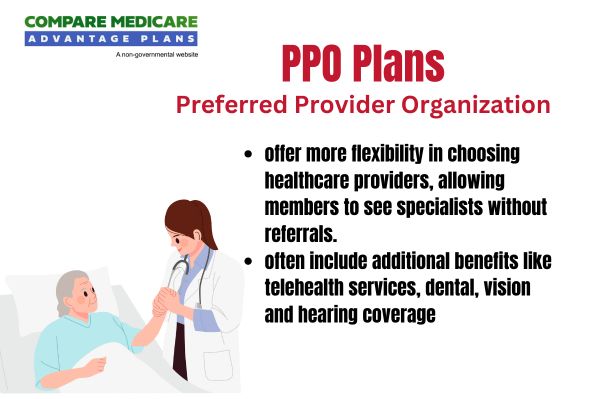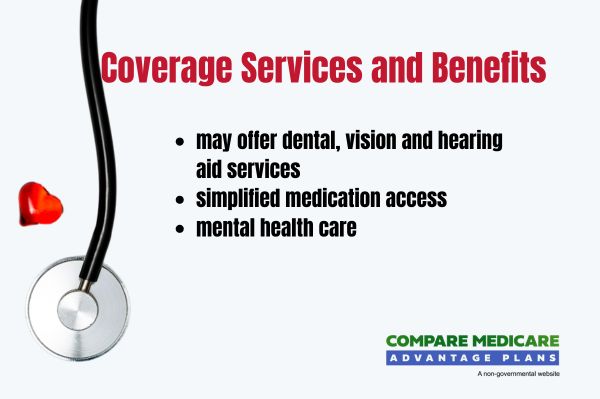Overview of UnitedHealthcare Medicare Advantage Plans

UnitedHealthcare has established itself as the most popular brand for Medicare Advantage, boasting a significant share of the market. With over 1 million providers in its Medicare Advantage network, UnitedHealthcare offers extensive accessibility to high-quality healthcare services. This widespread network ensures that members can find the care they need, wherever they are.
More than half of all Medicare beneficiaries are now enrolled in Medicare Advantage plans, highlighting the growing preference for these comprehensive packages over Original Medicare. Unlike the federal Medicare program provided by the federal government, Medicare Advantage plans, including medicare advantage part c, are offered by private insurers like UnitedHealthcare, which typically include additional benefits such as dental, vision, and wellness services, as well as medicare coverage. Additionally, these Medicare plans often provide enhanced services that cater to the diverse needs of beneficiaries.
UnitedHealthcare’s Medicare Advantage plans are designed to cater to diverse healthcare needs, offering various options that allow beneficiaries to choose plans that best suit their medical and financial circumstances. These plans often include added perks and resources that go beyond the standard offerings of Original Medicare, making them an attractive choice for many.
Finding UnitedHealthcare Medicare Advantage Plans in Your Area
Discovering the best UnitedHealthcare Medicare Advantage plan for your situation begins with a simple step: entering your zip code on their website. This feature allows you to zip code browse plans available in your area and receive personalized recommendations based on your specific healthcare needs and preferences.
Contacting UnitedHealthcare directly can provide tailored assistance in locating the right plan for you. The availability of specific plans can vary by location and eligibility, so it’s important to explore all available options to find the best fit.
Coverage Options and Benefits
UnitedHealthcare’s Medicare Advantage plans offer a variety of coverage options that extend well beyond what Original Medicare provides. Members can enjoy additional benefits such as dental, vision, and wellness services, ensuring a comprehensive approach to healthcare. Many plans even offer fitness memberships and wellness programs, encouraging a healthy lifestyle through gym memberships and preventive care services.
For individuals with specific chronic health conditions, UnitedHealthcare offers Chronic Special Needs plans. These are tailored to provide specialized care and benefits that address the unique requirements of managing chronic diseases. Additionally, members can earn rewards for participating in health-promoting activities, such as annual wellness visits, which further incentivizes maintaining good health.
Telehealth services have become an essential part of modern healthcare, and UnitedHealthcare ensures that its members can access:
- Virtual medical visits without copays
- Tools to estimate drug costs
- Tools to find doctors
- Tools to explore local community events
These services make it easier for members to manage their health.
Comparing UnitedHealthcare Medicare Advantage Plans
When choosing the right Medicare Advantage plan, balancing costs, benefits, and quality is crucial. UnitedHealthcare offers a range of plans that cater to different needs, but it’s also beneficial to compare them with other carriers like Humana, Aetna, Kaiser Permanente, and Blue Cross Blue Shield to find the best value and coverage.
Customer feedback can be incredibly valuable in this process. For instance, in J.D. Power’s 2024 study, UnitedHealthcare’s member satisfaction varies regionally, with top ratings in states like Florida and North Carolina, indicating the importance of considering regional feedback.
Furthermore, the National Committee for Quality Assurance rated UnitedHealthcare plans between 3.0 and 4.0 stars, reflecting a fair to good customer satisfaction score. Aligning your personal health needs with overall satisfaction ratings and the specific benefits of each plan will help you make an informed choice.
United Healthcare Medicare Advantage PPOs

UnitedHealthcare’s PPO plans offer a blend of flexibility and structured care. These plans allow members to choose their healthcare providers, including specialists, without needing referrals.
This flexibility is a significant advantage for those who prefer to select their own doctors and want the option of seeing both in-network and out-of-network providers.
How UnitedHealthcare PPO Plans Work
PPO plans provide members the freedom to receive care from any healthcare provider, but staying in-network usually results in lower out-of-pocket costs. UnitedHealthcare negotiates set rates with a network of providers, allowing members to pay reduced fees for in-network services.
These plans eliminate the need for referrals to see specialists, offering more direct access to various healthcare services. Additionally, PPO plans cover a range of services beyond Original Medicare, including extra benefits like routine vision and dental care, making them a comprehensive choice for many beneficiaries, including those considering Part C.
Flexibility to See Out-of-Network Providers
One of the standout features of UnitedHealthcare PPO plans is the ability to see out-of-network providers, although this typically incurs higher costs compared to in-network services. This flexibility is particularly beneficial for those who travel frequently or live in multiple locations, as it allows them to access care even when they’re away from home.
However, choosing out-of-network doctors may lead to additional out-of-pocket expenses and might require filing claims for reimbursement. Despite these higher costs, the ability to see specialists without referrals and the broad network access can be significant advantages for many members.
Typical Costs and Coverage in 2026
In 2026, UnitedHealthcare PPO plans may include various costs such as copayments for doctor visits and coinsurance for hospital services, with specific amounts varying by plan. While these plans might have higher premiums compared to HMO plans, they often provide broader access to specialists without needing referrals.
Many PPO plans in 2026 may offer monthly premiums as low as $0, although out-of-pocket expenses can differ significantly based on the services used. Furthermore, these plans typically have annual deductibles for both medical services and prescription drugs, which beneficiaries should consider when evaluating their healthcare costs.
Who Should Consider a PPO Plan?
Individuals who value the ability to see a wide range of specialists without needing referrals may find UnitedHealthcare’s PPO plans particularly beneficial. These plans are also ideal for those who travel frequently or live in multiple states, as they offer extensive nationwide provider networks.
People with chronic health conditions that require frequent specialist visits might prefer the flexibility of PPO plans. Additionally, those who have ongoing relationships with specific healthcare providers can benefit from the broader network access that PPO plans offer.
United Healthcare Medicare Advantage PPOs
UnitedHealthcare’s HMO plans are designed to offer a structured and cost-effective healthcare option. These plans require members to select a primary care physician who coordinates their care and provides referrals for specialist services.
While they may have lower premiums, they typically restrict members to in-network providers; network restrictions may apply, ensuring managed and coordinated care.
How UnitedHealthcare HMO Plans Work
UnitedHealthcare’s HMO plans emphasize affordability and coordinated care with the following features:
- Members must select a primary care physician (PCP) who oversees their healthcare needs.
- The PCP provides referrals to specialists.
- This model helps manage costs by ensuring that most care is received within the network.
The network of contracted providers allows for reduced costs for in-network care, making HMO plans a cost-effective option for many beneficiaries. However, the requirement for referrals to see specialists can limit direct access to certain healthcare services.












